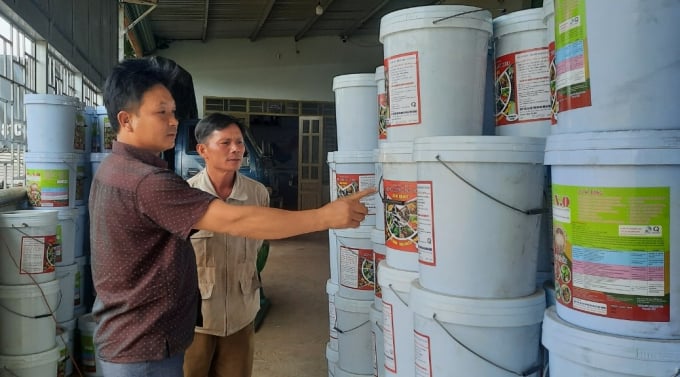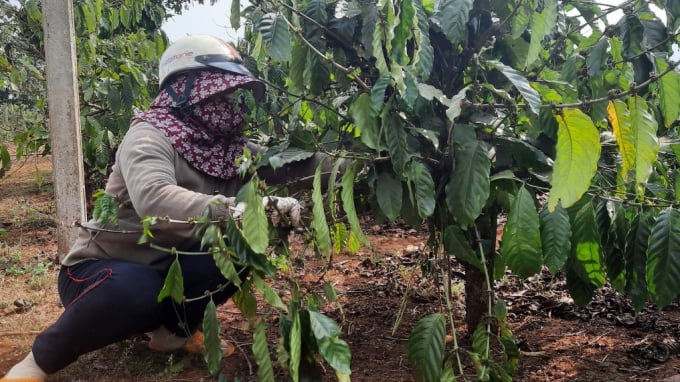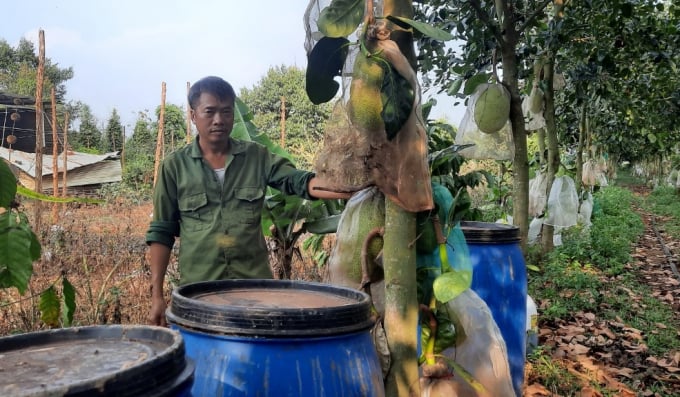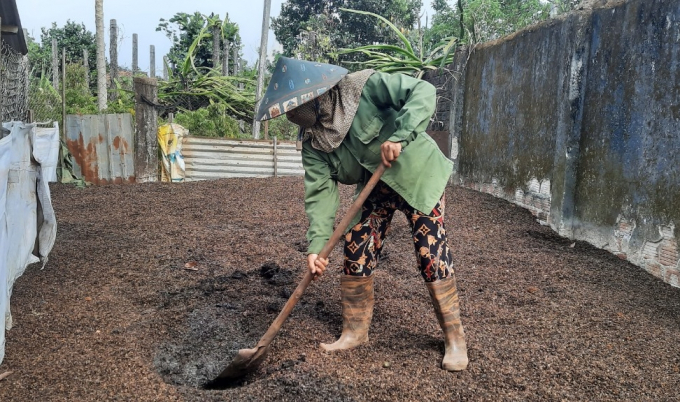November 27, 2025 | 19:15 GMT +7
November 27, 2025 | 19:15 GMT +7
Hotline: 0913.378.918
November 27, 2025 | 19:15 GMT +7
Hotline: 0913.378.918

The presence of organic fertilizers is becoming more and more vivid in Gia Lai. Photo: Tuan Anh.
Having just sold coffee harvested from the family’s 2 ha garden and collected the money, Mr. Chu Quoc Dan (group 2, Ia Ly town, Chu Pah district) immediately went to the fertilizer agent to pay the old debts. Like most other households, Mr. Dan and his wife often buy fertilizer in the form of overlapping debt and will pay after the harvest.
Mr. Dan said that last year the fertilizer price was not as high as it is now, and the investment cost was only over VND 80 million, but now fertilizer prices had nearly doubled, so the profit had amounted to zero.
“According to calculations, 1 ha of coffee can produce 4 tons of beans on average, so the profit VND 100 million. Meanwhile the fertilizer cost for that 1 ha is approximately VND 80 million at the moment. Plus electricity, water, and labor, at the end of the crop it is considered a capital loss," Mr. Dan said.
Seeing that the current situation is unfavorable, the family began to consider using organic fertilizers to lower the investment costs.
"A lot of people in the area have switched to using organic fertilizers made from cow and chicken dung. However, not all people have the available resource to purchase them because cow dung dealers don't accept debit.
On the other hand, if you switch to using organic fertilizers immediately, crop yields will not be as expected. Therefore, even if we switch to organic fertilizers, we still have to combine inorganic fertilizers sometimes, but of course the dosage will decrease over time."

Many coffee farmers are gradually switching to using manure in replacement for inorganic fertilizers. Photo: Tuan Anh.
Mr. Le Van Thanh, Director of Ia Mo Nong Agricultural Tourism Service, Trade and Production Cooperative (Chu Pah district), said that in face of the current rapidly intensifying situation of fertilizer prices all members in the cooperative had gradually switched to using organic fertilizers and reduced the dependence on inorganic fertilizers.
“The cooperative has laid out an agrorproduction procedure for coffee trees that combines organic and inorganic fertilizers so as to minimize the costs. If the people apply the procedure right, fertilizer costs may reduce to VND 30 million/ha - nearly two-thirds the amount of money they have had to spend on inorganic fertilizers over the past time."
In the midst of the skyrocketing fertilizer price, Mr. Nguyen Van Thien (Ia Ka commune, Chu Pah district) has never felt happier since knowing that the family's decision to use organic fertilizers is a correct choice.

Mr. Thien next to boxes of indigenous microorganism (IMO) organic fertilizers. Photo: Tuan Anh.
Nearly two years ago Mr. Thien completely switched to using organic fertilizers made from indigenous microorganisms (IMO). He could produce IMO organic fertilizer by using what was available in the place where he lived such as yogurt, human digestive enzymes and a mixture of some vegetables and tuber. “Just put them in a barrel, mix them with yeast, rice bran, molasses and clean water then incubate the mixture for 7 days, and we will have our own original IMO fertilizer.”
Normally, with 10 liters of the original IMO product, Mr. Thien would mix in some molasses, bran and clean water to multiply it to 100 liters, making the fertilizing process more comfortable without needing any other kind of nutrient to enrich the whole garden.
According to Mr. Thien, people spend at least VND 50 million on chemical fertilizers for 1 ha of crops, not to mention they still had to use manure. As for organic fertilizers, his family only invested more than VND 10 million/ha/year, and the results were totally different. Organic fertilizers made the soil richer and richer in nutrition, investment costs were lessened as time passed, leading to more sustainable production.

For many years Ms. Tu has been using manure in combination with coffee pods to fertilize her garden. Photo: Tuan Anh.
Fully aware of the current situation of input prices, Vice Chairman of Gia Lai People's Committee Kpa Thuyen has sent a document requesting localities in the province to promote instructions on the use of organic fertilizers in agroproduction, encourage, support organizations and individuals in the area to develop green, organic and sustainable production areas.
Translated by Samuel Pham

(VAN) According to Mr. Vo Minh Thanh, Director of the Tay Ninh Department of Agriculture and Environment, Resolution 57 has created a new development pathway for the locality, shifting from traditional toward modern agriculture.
/2025/11/26/4909-2-154329_878.jpg)
(VAN) Pearl grouper farming in HDPE cages not only delivers economic efficiency but also contributes to protecting the environment, creating jobs, and promoting marine-based experiential tourism.

(VAN) The model of making a living under the forest canopy through the agroforestry system in Van Son commune, Bac Ninh province, is expected to generate an annual income of approximately VND 30 million/ha.

(VAN) Many enterprises in Can Tho are harnessing natural energy and reducing greenhouse gas emissions in their production processes, thereby contributing to the promotion of a sustainable green transition.
/2025/11/24/3536-2-112800_176.jpg)
(VAN) Dong Nai now has tens of thousands of hectares of forests certified for sustainable management, and this area will continue to be expanded in the coming period.

(VAN) Vinh Ha hamlet (Dai Xuyen commune, Hanoi) is shifting away from small-scale farming as households adopt bioscurity into their breeder chicken models.

(VAN) Heavy rains make aquatic species more vulnerable to disease. Proactive water management and high-tech systems help farmers prevent outbreaks and protect yields.